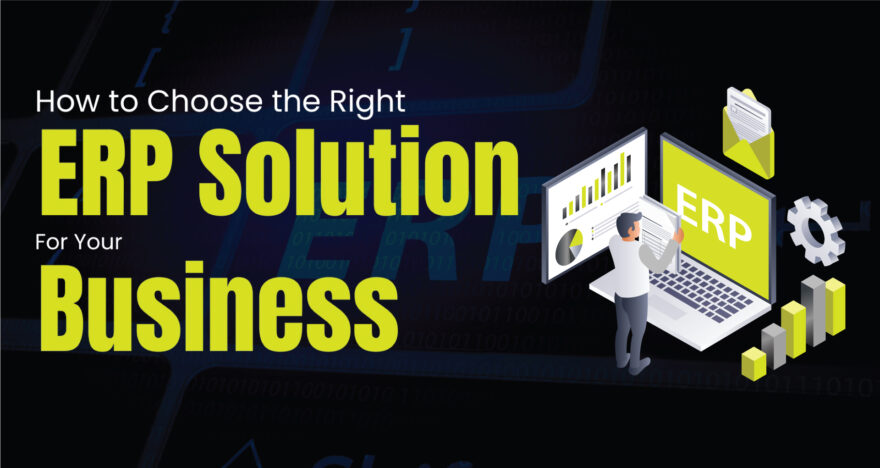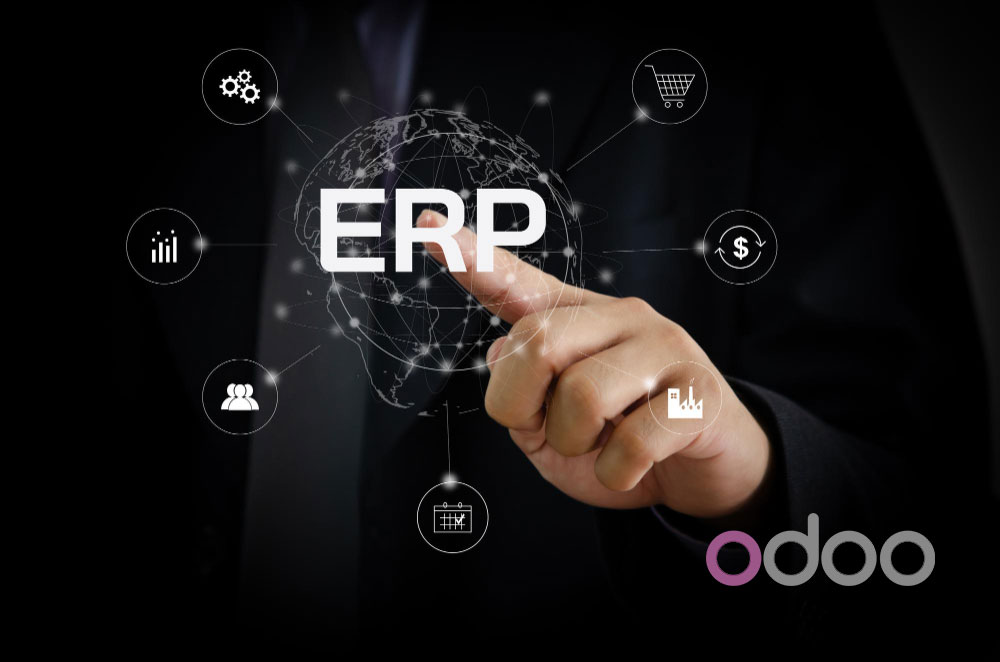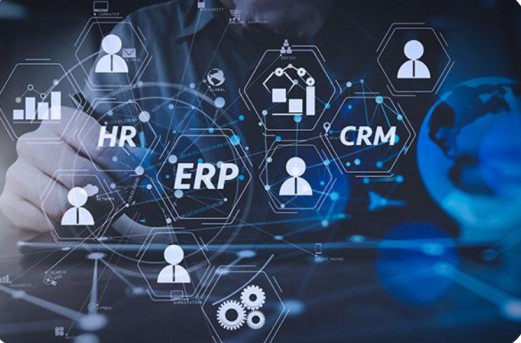There are numerous ERP software options available to enhance your business functionality, but the right choice depends on how well the system’s features align with your needs. When selecting ERP software, several factors should be considered: cost, business needs, customization capabilities, implementation time, deployment options, scalability for future growth, and integration capabilities.
Among the top ERP providers—SAP, Microsoft Dynamics, Odoo, Oracle, and Epicor—each has its strengths and suitability for different business contexts. This blog will guide you in identifying which of these ERP options might be the best fit for your organization, based on your unique needs and goals.
This blog will guide you through the key considerations and explore some of the leading ERP providers to help you choose the best fit for your business.
Choosing the Right ERP for Your Business
Selecting an ERP system that aligns with your organization’s needs can be a complex process, but having a strategic plan can streamline your efforts. While this isn’t a comprehensive guide, here are ten essential tips to help you get started on the right track. By following these recommendations and dedicating the necessary time and effort, you can effectively choose an ERP system that best meets your business requirements.
1. Understanding Your Business Needs
The first step is to assess your current processes and identify areas that need improvement. Analyze your existing workflows, systems, and pain points to determine the specific functions required from an ERP solution. Define your short-term and long-term goals, considering factors like finance, inventory management, human resources, and customer relationship management.
2. Involving Stakeholders
Engage key stakeholders from various departments to gather their input and ensure that the chosen ERP solution aligns with the needs of the entire organization. Conduct surveys, meetings, or interviews to understand their requirements and concerns. Establish a project team with representatives from different functions to oversee the ERP selection process.
3. Budgeting for an ERP Solution
Evaluate the Total Cost of Ownership (TCO) of different ERP options, considering both initial costs and ongoing expenses like maintenance, support, and upgrades. Assess the potential return on investment (ROI) by estimating the savings and efficiency gains that the ERP solution can bring. Consider your funding options, such as in-house deployment or cloud-based solutions, which may have different cost implications.
4. Researching ERP Solutions
Identify key features that are essential for your business, such as scalability, customization, and integration capabilities. Research potential ERP vendors, considering their reputation, reviews, case studies, and client testimonials. Evaluate industry-specific solutions that may offer tailored features and benefits for your particular sector.
5. Comparing Deployment Options
Decide between on-premises, cloud-based, or hybrid deployment options. On-premises solutions provide greater control but require significant upfront investment and ongoing maintenance. Cloud-based solutions offer flexibility, scalability, and reduced costs, but may involve data security concerns. Hybrid solutions combine the best of both worlds, providing a balance of control and flexibility.
6. Testing and Demos
Request demos from shortlisted ERP providers to see the software in action and assess its functionality. Consider conducting trial periods to evaluate the software’s usability, performance, and compatibility with your existing systems. Gather feedback from users to understand their experience and identify any potential issues.
7. Implementation Considerations
Develop a comprehensive change management plan to ensure a smooth transition and user adoption. Provide adequate training and support to help employees learn how to use the new ERP system effectively. Set realistic expectations for the implementation timeline and address any challenges that may arise.
8. Evaluating Long-Term Support and Maintenance
Consider the level of ongoing support provided by the vendor, including maintenance, upgrades, and troubleshooting. Ensure that the ERP solution is scalable to accommodate your business’s growth and future needs.
Which ERP system should you choose for business?
Some of the most popular ERP systems on the market include SAP, Microsoft Dynamics, Odoo, Oracle, and Epicor.
1. SAP
Overview: SAP is one of the world’s leading ERP providers, known for its robust functionality, especially in large enterprises. It offers comprehensive modules for finance, supply chain, production, and human resources.
Key Features:
- Comprehensive functionality: SAP provides industry-specific solutions and can handle complex business processes.
- Customization: Highly customizable but can be complex to configure.
- Scalability: Designed for large enterprises with the capacity to scale for multinational operations.
- Deployment Options: Available on-premise, cloud, or hybrid.
Best for: Large enterprises with complex and global operations needing a highly tailored ERP solution.
Considerations: SAP’s solutions come with a high implementation cost and longer deployment time due to its complex structure. It’s best suited for larger corporations with the budget and resources for such a system.
2. Microsoft Dynamics
Overview: Microsoft Dynamics offers a flexible and easy-to-use ERP system tailored to businesses of all sizes. It integrates seamlessly with other Microsoft products like Office 365, Teams, and Power BI, making it user-friendly for organizations already using the Microsoft ecosystem.
Key Features:
- Integration with Microsoft Suite: Works seamlessly with Microsoft products.
- User-Friendly Interface: Known for an intuitive user experience.
- Customization: Flexible customization options to suit specific business processes.
- Deployment Options: Available both on-premise and in the cloud.
Best for: Small to medium-sized businesses or enterprises already using Microsoft tools and looking for an easy-to-integrate ERP solution.
Considerations: Microsoft Dynamics is scalable, but it may not offer the same level of complexity as SAP for large multinational organizations. However, it’s ideal for businesses seeking a balance between cost and functionality.
3. Odoo
Overview: Odoo is a fast-growing open-source ERP system offering a wide range of fully integrated modules, from sales and inventory to accounting and HR. Its flexibility, affordability, and scalability make it a popular choice for small to medium businesses, as well as larger organizations.
Key Features:
- Cost-Effective: Odoo is known for being one of the most affordable ERP options without compromising on functionality.
- Highly Customizable: Its modular approach allows you to select only the apps you need, and it’s easy to customize.
- User-Friendly: Offers an intuitive interface with regular updates.
- Deployment Options: Available both as a cloud-based solution and on-premise.
Best for: Small to medium-sized businesses or enterprises looking for an affordable, highly customizable ERP with a modular approach.
Considerations: Odoo 18 has recently launched, showcasing features that cater not only to small and medium enterprises but also to large organizations. This powerful and flexible ERP solution is ideal for businesses aiming for growth without the hefty costs associated with traditional systems.
While the open-source version of Odoo offers significant customization possibilities, implementing it effectively may require some technical expertise, especially for complex needs. However, the cost of Odoo implementation remains affordable, and with the community version available for free, companies can explore its capabilities before making a commitment. This makes Odoo an excellent choice for organizations looking to enhance their operations without breaking the bank.
4. Oracle ERP Cloud
Overview: Oracle is known for its robust enterprise solutions, with a strong focus on finance, supply chain, and human resources. Oracle ERP Cloud is designed to provide a scalable solution for mid-size to large businesses, with powerful analytics and AI-driven insights.
Key Features:
- AI and Machine Learning: Advanced analytics and AI-driven insights for decision-making.
- Comprehensive Modules: Covers financials, procurement, project management, and more.
- Global Capabilities: Designed for multinational operations with multiple currencies, languages, and compliance standards.
- Deployment Options: Cloud-based, with strong integration capabilities.
Best for: Large enterprises with complex financial and operational needs, looking for cutting-edge technology and global scalability.
Considerations: Oracle ERP Cloud comes with a high cost of ownership and is better suited for larger organizations. Its advanced analytics and machine learning features make it ideal for businesses looking to leverage technology for strategic growth.
5. Epicor
Overview: Epicor focuses on delivering ERP solutions for specific industries, such as manufacturing, distribution, retail, and services. It’s known for its in-depth industry knowledge and tailored solutions that cater to the unique requirements of each sector.
Key Features:
- Industry-Specific Solutions: Tailored to the needs of manufacturing, retail, and distribution industries.
- User-Friendly Interface: Focuses on delivering a straightforward and easy-to-navigate system.
- Scalability: Ideal for medium-sized businesses looking to grow.
- Deployment Options: Offers both on-premise and cloud solutions.
Best for: Medium-sized businesses in manufacturing, distribution, or retail that require industry-specific functionality.
Considerations: Epicor’s industry focus is a significant advantage for businesses in its target markets, but it may not be the best option for companies in other sectors. It’s ideal for businesses looking for a specialized ERP system that caters to their industry needs.
Conclusion
Choosing the right ERP solution is a critical decision that can greatly impact your business’s efficiency, scalability, and growth. Each ERP system—whether it’s SAP, Microsoft Dynamics, Odoo, Oracle ERP Cloud, or Epicor—offers unique features and capabilities tailored to different industries, business sizes, and needs.
Ultimately, the best ERP for your business will depend on your specific needs, budget, and long-term goals. By carefully considering the factors discussed—such as customization, scalability, integration, and deployment options—you can make an informed choice that sets your organization on a path toward improved efficiency and sustained success.



2 thoughts on “How to Choose the Right ERP Solution for Your Business”